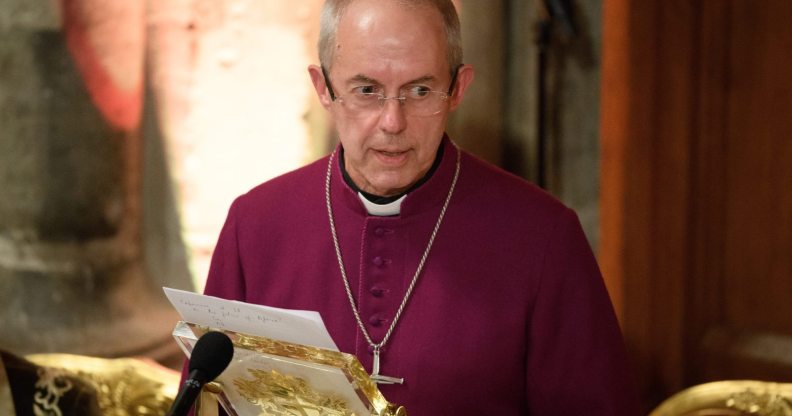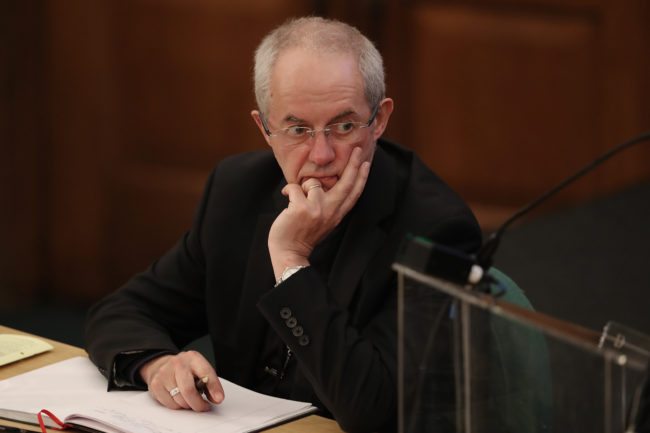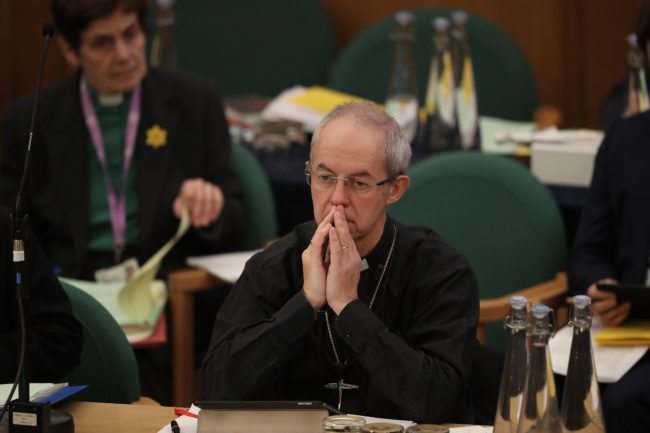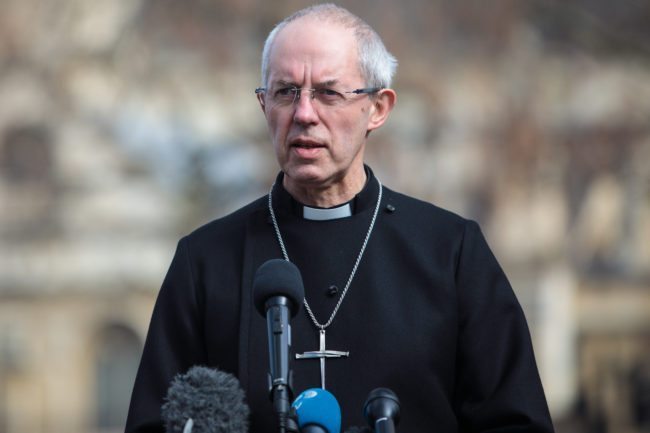Archbishop of Canterbury: Gay people ‘have been appallingly treated’ by Church of England

Archbishop of Canterbury Justin Welby. (Leon Neal/Getty)
Archbishop of Canterbury Justin Welby. (Leon Neal/Getty)
The Archbishop of Canterbury has admitted that gay people have been “appallingly” treated by the Church of England.
Archbishop Justin Welby has been at the centre of splits in both the Church of England and the global Anglican Communion over LGBT issues.
Liberal clergy are pushing for a more accepting stance towards same-sex couples, while traditionalists want the Church to stick by teachings that homosexuality is “unnatural”.
Welby, who previously admitted his own handling of the issue has been poor, told the Guardian that his own views had shifted on the issue.

Archbishop of Canterbury Justin Welby (Dan Kitwood/Getty)
He said: “Are my views different to 25 years ago? Yes.”
Asked if his views had changed in the past five years, he said: “I hope they’re deeper. I’ve not changed in the sense that I believe the scriptures, properly interpreted, remain for me the final authority in matters of doctrine, in matters of practice. But the phrase is ‘properly interpreted’.
“And we are continuing as a church to debate with each other, to discuss with each other, and to listen to particularly the voices of LGBTIQ+ people who historically have been appallingly treated and never listened to.
“I think we are changing very distinctly. You talk to [the bishops leading the C of E’s work in the issue] and I think they would say the whole church is on a journey … and I’m part of that.”
The Archbishop has previously warned that the Church of England’s split over LGBT issues could be “irreconcilable”.

Archbishop of Canterbury Justin Welby (Dan Kitwood/Getty)
The Church of England has been unable to agree stances on whether to allow ‘blessings’ for same-sex unions – while rules that ‘punish’ gay clergy members for getting married have come under fire.
The Church has also been split on whether to support a ban on ‘gay cure’ therapy, and whether to ‘welcome and affirm’ transgender people.
Meanwhile the Anglican Communion, an alliance of churches across the world, is even more fractured over gay issues.
Hardline Anglican churches in Africa preach the absolute rejection of homosexuality and preachers have been vocal in supporting anti-gay sodomy laws.
Meanwhile some Western churches, including the Episcopal Church in the US and the Scottish Episcopal Church, have fully embraced same-sex unions.
The divide has led to boycotts of Anglican Communion events, and Welby has been forced to doll out surreal ‘punishments’ to LGBT-inclusive Churches in order to appease the hardliners.

Archbishop of Canterbury Justin Welby (Photo by Jack Taylor/Getty Images)
Welby told GQ in November 2017: “It is just irreconcilable. There are some disputes that are irreconcilable. I don’t know [where it goes] at the moment.
“What I know is we have to be faithful to the deposit of faith, the tradition of scripture. We have to be holy, above all.
“We have to be people who look like God wants us to look like. When people look at the church they should see Jesus, and really, they don’t very often, particularly when we are totally hostile to people, judgemental, unpleasant, nasty.”
He confessed that his handling of the issue had been poor, saying: “I am having to struggle to be faithful to the tradition, faithful to the scripture, to understand what the call and will of God is in the 21st century and to respond appropriately with love for all people – not condemning them, whether I agree with them or not. That covers both sides of the argument.
“I am not doing that bit of work as well as I would like to.”
He added: “The generosity I’ve received from gay friends in the midst of not handling this issue very well, and from people who are very traditionalist, has led to me being much less certain than I would have been 10 or 15 years ago.”
But the Archbishop skirted questions about whether he believes gay sex is a sin.
He said: “You know very well that is a question I can’t give a straight answer to.
“I don’t do blanket condemnation and I haven’t got a good answer to the question. I’ll be really honest about that. I know I haven’t got a good answer to the question.
“Inherently, within myself, the things that seem to me to be absolutely central are around faithfulness, stability of relationships and loving relationships.”

